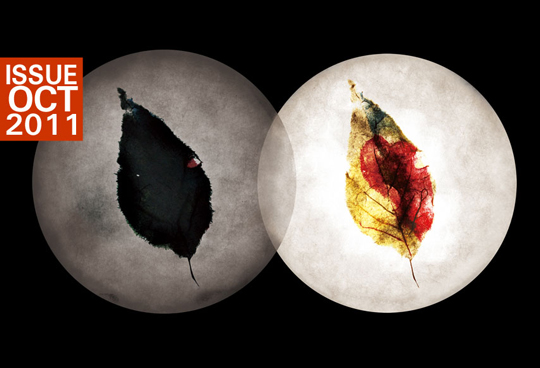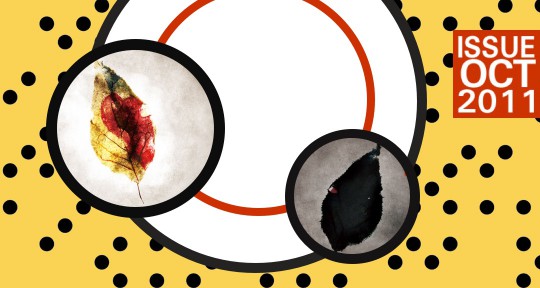Miraculously, word spreads. Asymptote is selected as The Center for Fiction’s international journal of the month for September 2011. Publishers Weekly features us in a writeup. We are a Paris Review staff pick: apparently, poetry editor Robyn Creswell has been “poking around in Asymptote” and has “especially enjoyed the (very) short story by Robert Walser, translated by Susan Bernofsky, Adonis’s “Ambiguity,” translated by Elliott Colla, and an essay about riddles by the Russian formalist Viktor Shklovsky, translated by Shushan Avagyan(!)” Literary heavyweights Jane Hirshfield and John Kinsella, whom I don’t know personally, write to offer blurbs in support. I discover that Parul Sehgal, an award-winning literary critic I admire, has a Singaporean connection. Had she been based in Singapore, would her talent in literary criticism have been recognized? Would it even have flourished in the first place? This inspires me to move to Taiwan for the lower cost of living. Here to introduce the first issue that I edited out of Taipei (and that also features my translations of Jing Xianghai and Belinda Chang) is contributing editor Sim Yee Chiang.
As I re-read the interview I conducted with Motoyuki Shibata for the Fall 2011 issue of Asymptote, I am catapulted at once to the terror of that late summer afternoon at the University of Tokyo. Why on earth had I insisted that we speak in Japanese? I was armed with notes, even a few jaunty segues, but I knew my adopted tongue could abandon me at any moment, just as it had abandoned me six months before at a disastrous interview for prospective Ph.D. students.
What prevented disaster that day was hearing Professor Shibata talk about the “pleasure” of literary engagement and translation. Translators tend to fall prey to all kinds of pesky anxieties: of influence, of equivalence, of legitimacy etc. Even now, years after that conversation, I still find the principles of pleasure and humour not only useful defences against said anxieties, but also indispensable qualities of a successful translation.
By a happy coincidence, in the issue’s other interview, literary critic Samia Mehrez also mentions the importance of political humour in the Egyptian revolution of 2011 and notes the challenges it can pose for translation. It is through this pleasure and humour that I wish to revisit an issue that was released almost seven years ago. I intend no disrespect to those articles that warrant a less frivolous form of engagement, such as Liao Yiwu’s chilling account of an execution in Communist China, or Éva Fahidi’s personal struggle with the memory of Auschwitz. Asymptote is a celebration of plurality, and what I present here is simply one view of the kaleidoscope.
 Our first stop: the acerbic primer to Croatian literature written by Dubravka Ugrešić, which was the journal’s first work translated from Croatian. If you know anything at all about the linguistic and cultural complexities of the Balkan states, I’m sure you’d get a lot more out of this piece than I did. But even without such background information, Ellen Elias-Bursac’s translation instantly conveys the frustrations of being on the periphery, of struggling to articulate an identity in the face of nationalist agendas, of being weighed down by historical baggage and other absurdities. (For more laughs, try looking up the history of the term “Kakania.”)
Our first stop: the acerbic primer to Croatian literature written by Dubravka Ugrešić, which was the journal’s first work translated from Croatian. If you know anything at all about the linguistic and cultural complexities of the Balkan states, I’m sure you’d get a lot more out of this piece than I did. But even without such background information, Ellen Elias-Bursac’s translation instantly conveys the frustrations of being on the periphery, of struggling to articulate an identity in the face of nationalist agendas, of being weighed down by historical baggage and other absurdities. (For more laughs, try looking up the history of the term “Kakania.”)
The poetry section of this issue contained other newly-represented languages such as Tamil, Filipino, and Burmese. I found the wry, modernist flair of one Burmese poet, Khin Aung Aye, particularly memorable. In the translation by ko ko thett and James Byrne (juxtaposed next to the original text), politically-laden zingers (“wheat as a replacement crop for poppy”) are deftly interlaced with rhythmic fragments (“how tediously tolerant they are he only he was capable of penning such lines […]”).
I’ll end with the excerpt from A. L. Snijders’ The Mole and Other Very Short Animal Stories (Dutch was yet another linguistic first for the journal, but more incredibly, these were Lydia Davis’ first translations from the Dutch that would ever be published). In her charming translations of these microfictions, we are given snapshots of familiar animals in unfamiliar lights, and the experience may be described as taking several sips of whimsy laced with malcontent. It occurs to me now that very short stories are perhaps the ideal form of literature for the digital age: easily-consumed content distilled to aphoristic intensity. Drink up, dear reader, the rest of the issue awaits!
Sim Yee Chiang is a contributing editor at Asymptote.
With mysterious sounds from outer space, the Fall 2011 issue is truly out of the world. Help us give you more of what you love: Sign up as a masthead member or sustaining member today!

